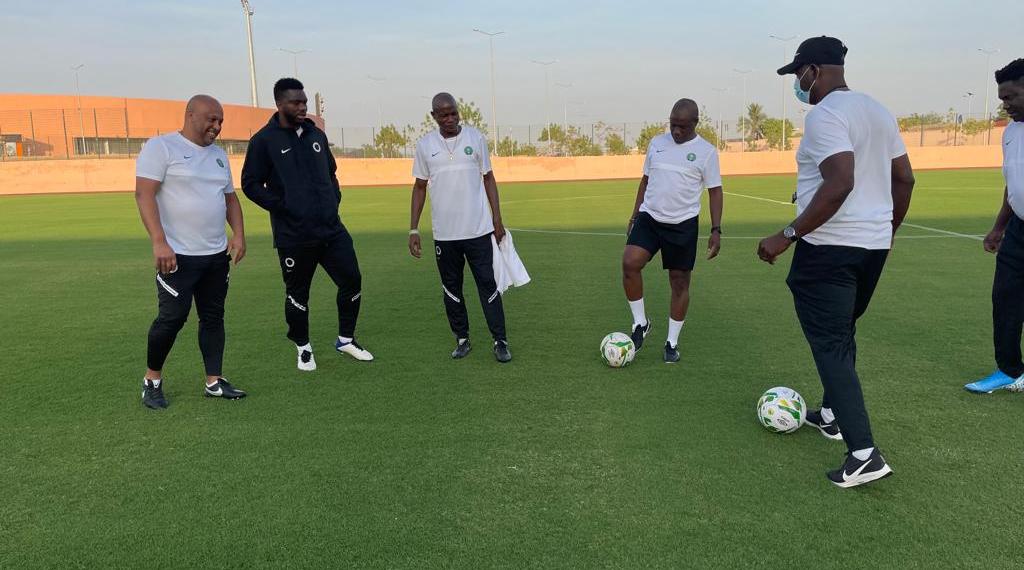AFCON: Can Eguavoen prove his coaching credentials where he failed in 2006?
Augustine Eguavoen’s status a Nigerian football legend is unquestionable. The 56-year-old Edo indigene has been synonymous with Nigerian football since 1987, first as a defender before coaching and technical roles. He was part of the side that finished second at Morocco ’88 and captained the 1994 title-winning Super Eagles team before retiring in 1998. Cerezo […]

Augustine Eguavoen’s status a Nigerian football legend is unquestionable. The 56-year-old Edo indigene has been synonymous with Nigerian football since 1987, first as a defender before coaching and technical roles. He was part of the side that finished second at Morocco ’88 and captained the 1994 title-winning Super Eagles team before retiring in 1998.
Cerezo returned as a coach in 2001 after a second-place league finish at Malta’s Sliema Wanderers in his first managerial role.
The prospect shown in Malta was first tested at the 2003 Under-17 FIFA World Cup in Finland but an unfortunate coin toss loss knocked out his Eaglets at the group stage despite playing some entertaining football with astute tactics. He got his first Super Eagles shot two years later as interim manager at the 2006 AFCON in Egypt where he led Nigeria to a third-place finish. Eguavoen had the experienced Austin Okocha, Kanu Nwankwo, Garba Lawal, and Wilson Oruma mixed with quality youngsters Obafemi Martins, Mikel Obi, Vincent Enyeama among others but failed in Egypt.
- AFCON: My boys are not against my training methods – Eguavoen
- VAR to be used in all 52 AFCON matches in Cameroon – CAF
While his team dispatched Ghana, Zimbabwe and Senegal to take maximum group stage points, Eguavoen’s tactics fell flat in the semi-final as Eagles lost to a Didier Drogba-inspired Ivory Coast. However, his Egypt 2006 team was reputed for being hard to beat; the dependable Enyeama in goal, Joseph Yobo in defence, and Christian Obodo in midfield gave the mercurial forwards a fulcrum to spring in attack.
As a coach that favours young talents, his present squad in Cameroon mirrors the 2006 group sprinkled with necessary experience. Despite late withdrawals, 17 of his 28-man team are 25 years old or younger, with experienced familiar faces in defence set to complement a young midfield and attack. The likes of Samuel Chekwueze, Taiwo Awoniyi, Wilfred Ndidi, Kelechi Iheanacho, Chidera Ejuke, and other young attackers could become match winners as Eguavoen hopes to prove his coaching credentials that would surely receive public criticism if he fails to inspire.
When asked what he and his players would do differently from 2006, Eguavoen preached taking the tournament per game. “I think having come here and given the opportunity, we just have to take advantage. We are working hard to dig in game after game and try to go all the way. We are going there to fight and make Nigeria proud,” he said at a press conference before his team left for Cameroon.
Eguavoen, who has only a Federation Cup title in 2009 with Enyimba to show for his 21-year managerial sojourn, added that he has “grown as a coach” and there will be “no excuses” despite his team not having the best preparations and is set to square off with Egypt, Sudan and Guinea-Bissau in Group D. His generals, Captain Ahmed Musa and Vice-captain William Troost-Ekong also praised the unity of the team and harped on “faith” and “confidence” in the attackers to make a difference despite the enforced absence of on-form trio of Victor Osimhen, Emmanuel Dennis and Odion Ighalo.
Whatever happens in Cameroon, Eguavoen has already stated that his office as the NFF technical director would be waiting for him.
However, his reputation as a coach could hit rock bottom if he does not do the minimum of equaling his 2006 semi-final record or surpass it.
